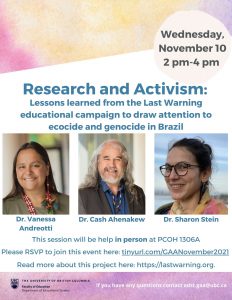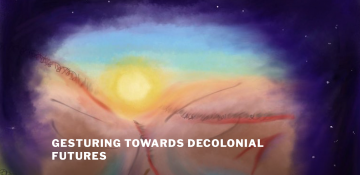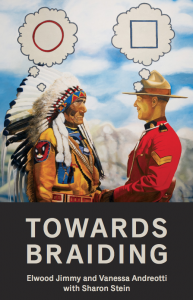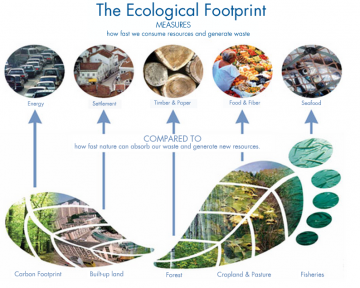Gesturing Towards Decolonial Futures (GTDF) is an arts/research collective that uses their website as a workspace for collaborations around different kinds of artistic, pedagogical, cartographic, and relational experiments that aim to identify and de-activate colonial habits of being, and to gesture towards the possibility of decolonial futures. The experiments presented on the GTDF website are not for mass consumption. In some contexts, the exercises proposed by GTDF may be extremely helpful in moments of personal or collective crises, in other contexts, the same exercises can push some people into spaces where they might need personalized guidance to process what is happening. GTDF recommends discernment when using the materials on their site.
Gesturing Towards Decolonial Futures prioritizes collaborations with initiatives that adopt a decolonial orientation, inviting collective imaginings beyond human existence defined by capitalism, socialism or nation-states; the separation between humans and nature; a singular totalizing rationality and single stories of progress, development and human evolution. To begin let’s start by riding the bus. “The bus” is a central figure in a methodology for collective inquiry that emerged as a response to the need for difficult, honest and sober conversations where the integrity of relationships are prioritized above the emotional charge of the content being discussed. In the video below, listen to Dr. Andreotti explain this methodology for holding space for complexities within and around us.
Systemic violence is complex and multi-layered. One thing that cuts across layers is the disproportionate amount of labour that Indigenous, Black and other racialized people bear when they are expected to teach other people about systemic colonial and racial violence. The next poems featured in the GTDF website ask us to reflect on the structural inequities we are all part of. The Why I Can’t Hold Space for You Anymore poem lists the reason why it is emotionally and physically costly for Indigenous, Black and racialized people to hold spaces for other people to learn about their complicity in systemic harm. The Wanna be an ally? poem by Elwood Jimmy and Vanessa Andreotti emerged from the experiences of many bodies who have been systemically impacted by the violences of colonialism and the difficulties of decolonization. The poem is featured on their open access book Towards Brading hosted and funded by the Musagetes Arts Foundation.
The house of modernity mini-zine is a pedagogical experiment that invites conversations about our collective existence in a planet facing unprecedented crises. The mini-zine presents two cartographies that comprise a theory-of-change. Every theory of change is made up of a diagnosis of the present, and a proposition about a horizon for change. On one side of this mini-zine there is a diagnosis (the house), on the other side, the proposition for a horizon and for a way of moving together (mushrooms and mycelium). Head to the house of modernity webpage for the complete explanation of the pedagogical experiment and to find the PDF to print out. In the video below, learn how to fold the mini-zine.
The following exercise titled Education 2048, may help us (self-)evaluate our preparedness for social and ecological storms and investments in the house of modernity. Education 2048 is a thought experiment, or rather a head/heart experiment that was developed by the GTDF collective for a conference in Germany in August 2020. Since education is much broader than schooling, GTDF found that it was problematic to assume that education in 2048 would still happen through schools, a different kind of future-focused activity was developed. In the video below, listen to Dr. Andreotti explain the two parts to this head/heart experiment. In the first part, the experiment invites you to imagine a scenario, in the second part, you are invited to consider two sets of questions.
Indigenous pedagogy is a call to responsibility. It is about “growing up” and become a good elder and a good ancestor for all relations. It happens through deep questions, stories and practices that involve the body, the land and the non-human beings who are part of the land. Next, we will go through two digital resources that require us to reflect on two important numbers that may be difficult to carry. These numbers remind us how we are complicit to the modern world and make us reflect on ways we can change towards the possibility of a better future, decolonial futures.
- The Ecological Footprint is the only metric that measures how much nature we have and how much nature we use, it calculates the number of planets we would need if everyone had your lifestyle.
- The Slavery Footprint is a survey that asks and responds to the question, “How Many Slaves Work For You?”, it calculates the number of modern slaves that your lifestyle requires.
On Wednesday, join Dr. Andreotti, Dr. Ahenakew and Dr. Stein, as they share insights from Research and Activism! They will share lessons learned from the Last Warning educational campaign to draw attention to ecocide and genocide in Brazil. The Amazon holds a unique place within the living fabric of the Earth. Its significance to the climate emergency and the wider extinction crisis is attested by science, while its role in the cultural imagination of environmental movements is unparalleled. An educational campaign about the importance of, as well as threats to, the Amazon rainforest and Indigenous rights in Brazil, was launched last summer. The Last Warning educational initiative is an extension of a long-term research collaboration between the Huni Kui Indigenous People’s Federation in the Amazon and researchers from the Department of Educational Studies at UBC, including Dr. Vanessa Andreotti, Dr. Cash Ahenakew, and Dr. Sharon Stein.
Date and Time: Wednesday, November 10th at 2 pm.
Location: Ponderosa Commons 1306A
RSVP here: https://ubc.ca1.qualtrics.com/jfe/form/SV_2l3eSI8MvIRTADY



